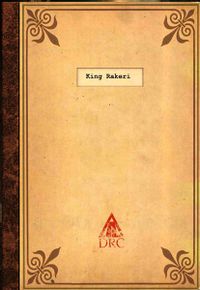Reference:DRC research notebooks/King Rakeri
 | |
| Location | Hall of Kings, Ae'gura |
|---|---|
Rakeri took the throne in 3000 at the age of 81. In the same year of Rakeri's coronation ceremony, a man by the name of Tevahr was born. Beginning in 3077, many say he defined Rakeri's reign more than Rakeri himself[1].
Tevahr was an ardent follower of the Great King and spent his entire growing up studying the King's teachings and words. By the time he was sixty-five he was apparently appalled at the state of his people, especially pertaining to religious matters. Though he began on a small scale, in a matter of years, Tevahr became one of the most influential men in D'ni history.
He was a powerful leader, a gifted speaker, and a tremendous motivator and by 3077, a well-known name. It was 3077 that Tevahr publicly denounced the sects and his people's (including the government's) lack of faith in the principles and laws of Yahvo that they were founded upon. He often pointed to the Council Chamber (and other government structures) that now covered the Tomb of the Great King as a symbol of what the hearts and souls of D'ni had become. "There is no longer time for religion as government and power have stolen our love," he stated numerous times. Most of the public seemed to agree with Tevahr, especially concerning the Tomb of the Great King and its covering; they believed they should never have allowed it to happen.
Although not remembered as a great event in itself, most historians agreed that credit should be given to Rakeri's reaction to the teachings of Tevahr. Rakeri, at first, was infuriated at Tevahr's speeches and his apparent disapproval of the culture. In return he denounced Tevahr and his teachings, and even threatened to have him imprisoned.
In 3081, Rakeri supposedly attended one of Tevahr's speeches in an effort to ridicule it and give the other side to the public. Instead he ended up in a public debate with Tevahr. According to witnesses, it was a debate that Tevahr clearly won[2]. Though Tevahr handled the debate with the King as best he could, at times his words were rather harsh; words to which the King had no response, and ended up bringing quite a bit of ridicule upon himself instead of Tevahr. However, instead of ordering Tevahr's death, which he probably could have done, he returned to his palace and thought about what he had heard[3].
Five days later, Rakeri personally invited Tevahr to the palace and later that same day announced that he had chosen Tevahr as his main prophet[4] and asked forgiveness from his people for the wrongs, not only of himself, but of the Kings before him. Those who personally witnessed the speech of King Rakeri left the event transformed[5]. It was not long until their personal transformations, began to change the entire culture.
By 3100, six hundred years after government records showed 2500 registered sects, there were forty-seven sects in existence. Only ten of those sects' membership was greater than five hundred. The public seemed to return again to the beliefs their culture had been founded upon, those that Ri'neref had taught and the Great King had expanded upon.
The people were again unified and much work was done to join the classes of rich and poor that by that time, had already begun to separate. There was major renovation of deteriorating districts (mostly poor) and construction of a new Theatre Company and Concert Hall in the Belari District, what had been one of the poorer districts in the entire city.
In 3112, Rakeri announced, with Tevahr by his side, plans for grand renovations (an almost complete reconstruction) of the Great Temple. Rakeri also announced that the old line of the Great Zero was accurate and should be honored again.
The Temple itself was to take advantage of handheld extruder technology that had been developed in 3092. As well as the great artist Fahlee[6] was to paint the inside of the Temple. As it turned out it was Fahlee's final masterpiece as he passed away in 3123, six months after the completion of the Temple.
For the remaining years of Rakeri's reign expansion continued both outside and inside the cavern. New mining technology was seemingly announced annually, bringing with it great prestige to the relatively new formed Major Guild of Miners.
Tevahr passed away at the young age of 218 in 3218. Rakeri was so greatly disturbed at his passing that he ordered five days of national sadness. There were minor protests from a few of the still remaining sects (who obviously did not follow the order) but for the most part D'ni mourned with Rakeri over the loss of the prophet.
Rakeri died a year after Tevahr at the age of 300, leaving the throne to his first-born son Tejara.
- ↑ From Yahvo's Voice written by Adesh in 3143
- ↑ Many witnesses' testimonies of the event are chronicled in Yahvo's Voice.
- ↑ According to the Prophetess Shama, Rakeri was greatly affected by the words. He refused to speak to anyone for two days following the debate.
- ↑ Though women usually took the roles of Prophets, the choice of Tevahr was one that no one argued. Shama herself was said to be thrilled that Tevahr's wisdom was being sought.
- ↑ From Yahvo's Voice written by Adesh in 3143
- ↑ Considered by most to be the greatest artist of the D'ni Renaissance